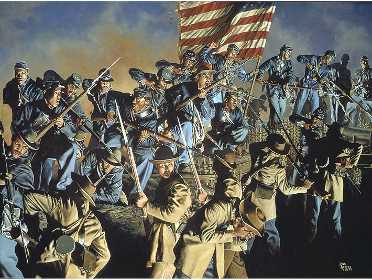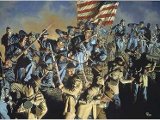African Americans in the Civil War

Table of Contents
- African American Volunteers at the Outbreak of the Civil War
- Militia Act of 1862 and Enrollment of Black Soldiers in the North
- The 54th Regiment Massachusetts Volunteer Infantry
- African Americans in the Confederate States
- Discrimination of Black Volunteers
- African American Prisoners of War
- African American Contribution to the Union Victory
Quick Facts
African Americans were officially excluded from military service until adoption of the Militia Act of 1862.
Enrollment of black soldiers in the North was slow also due to racial prejudice.
African American volunteers in the Union Army experienced considerable discrimination.
Shortly before the end of the war, the Confederate Congress passed an act foreseeing recruitment of black slaves.
Harsh treatment of black prisoners of war by the Confederate Army forced Abraham Lincoln to issue the Order of Retaliation.
About 180,000 African Americans served in the Union Army as soldiers, while about 19,000 served in the Navy.
Escaped slaves formed about one half of all US Colored Troops.
About 40,000 African American soldiers died in the Civil War.
African American Volunteers at the Outbreak of the Civil War
The problem of black enslaved laborers was one of the main causes of the American Civil War, however, free black men who wanted to join the Union Army after the outbreak of armed hostilities at Fort Sumter were refused. African Americans fought in both the Revolutionary War and the War of 1812 but according to the Federal law from 1792, black men were officially excluded from the state militia which conscripted only “free able-bodied white male citizens”.
Militia Act of 1862 and Enrollment of Black Soldiers in the North
Decline of enthusiasm for the war among the “free able-bodied white male citizens” and the rising number of escaped slaves in the second year of the war forced the US government to reconsider the Federal law from 1792. The Militia Act of 1862 passed by the Congress on July 17, 1862, allowed free African Americans and escaped slaves to join the US Army as soldiers and laborers. Their enrollment into the Union Army, however, took place slowly also due to racial prejudice and conviction that African Americans are not able to provide strong military service.
The 54th Regiment Massachusetts Volunteer Infantry
The first official call for black soldiers was issued only after the Emancipation Proclamation by Governor of Massachusetts, John A. Andrew. Black volunteers formed the 54th Regiment Massachusetts Volunteer Infantry which became one of the first official African American regiments in the Civil War. On July 18, 1862, they attacked Fort Wagner at Charleston, South Carolina (the Second Battle of Fort Wagner). The attempt to capture the fort had failed and about half of the regiment was killed, however, their courage in the battle proved that black soldiers are just as brave and committed as the white ones.
African Americans in the Confederate States
The idea of using black slaves as soldiers was present in the South since the outbreak of the Civil War. But it was not until the beginning of 1864 when General Patrick Cleburne proposed enrollment of slaves. Cleburne’s proposal was rejected by Confederate President Jefferson Davis but shortly before the end of the war, the Confederate Congress passed an act which foresaw recruitment of slaves. The war, however, ended before the new strategy could yield results. In addition, slaves were needed on the plantations because most white men were conscripted. The American Civil War increased the pressure on black slaves in the Confederacy and as a result, many fled from their masters, while the others demanded more rights.
Discrimination of Black Volunteers
The 54th Regiment Massachusetts Volunteer Infantry impressed the white generals and Abraham Lincoln himself, however, discrimination of African American soldiers continued. They formed segregated units which were typically commanded by white officers, while many white generals and officers were convinced that African Americans were more suitable for jobs like cooks, carpenters and other non-combat functions. According to the Militia Act of 1862, African American volunteers were paid $10 a month minus $3 for a clothing allowance. White soldiers, on the other hand, were paid $13 and a clothing allowance. This changed only in 1864 when the US Colored Troops were granted equal pay by a bill passed by the Congress. Furthermore, the Emancipation Proclamation granted freedom to slaves in the Confederacy but not in the loyal and border slave-holding states. As such, the Emancipation Proclamation had virtually no effect on slavery in the United States. It did, however, guarantee freedom to escaped slaves and paved the way to the 13th Amendment to the United States Constitution which was proclaimed on 18 December, 1865, and freed all slaves on the territory of the United States.
African American Prisoners of War
In addition to being faced with the horrors of the war and discrimination, African American soldiers were also in serious danger if captured by the Confederates. Since most African American Union soldiers (including the free ones) were either enslaved or executed, Lincoln issued the Order of Retaliation on July 30, 1863. This slightly improved the treatment of African American prisoners of war, however, uncertain fate of black soldiers if captured in the battle was also one of the main reasons why they were not used in combat in the extent they could have been.
African American Contribution to the Union Victory
At the time of the surrender at Appomattox Courthouse which ended the American Civil War, about 180,000 African American served as soldiers in the US Army, while about 19,000 served in the Navy. About 50 percent of African American soldiers in the Civil War were former slaves from the Confederacy, 25 percent came from the loyal slave-holding states and the remaining 25 percent were free black men from the Union. About 40,000 African Americans died during the war from which 10,000 died in combat, while the others died from infection or diseases.




